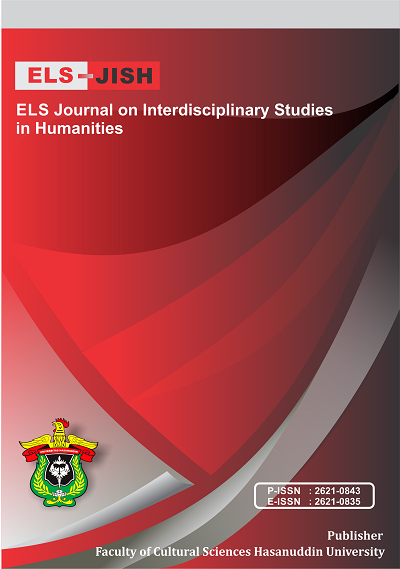The Portrayal of African Woman’s Struggle Reflected in the Novel “How Beautiful We Were” By Imbolo Mbue (2021)
DOI:
https://doi.org/10.34050/elsjish.v7i2.34882Keywords:
Ecofeminism, Woman’s Struggle, Thula, NovelAbstract
Ecofeminism is an understanding of the relationship between women and the universe that approaches issues of environmental degradation and social injustice from the premise that how we treat nature and how we treat each other are inseparable. This research discusses the character of a woman in the novel How Beautiful We Were which aims to find out the depiction of the struggle of African women in protecting their environment. This research uses the theory of ecofeminism from Greta Gaard and Murphy with descriptive qualitative research methods and note- taking as an instrument. This research was conducted to add and give awareness to readers about the importance of preserving and protecting the environment around us. The results found in this novel that the female character named Thula fulfills the three aspects of women's struggle in the theory of ecofeminism. The researcher concluded that in this novel, the most visible struggle of women leads to the community, so that the movement carried out by the main character is able to realize that it is important to fight for and protect our nature from the threat of companies that come to destroy it
References
Aftab, J., & Veneziani, M. (2024). How does green human resource management contribute to saving the environment? Evidence of emerging market manufacturing firms. Business Strategy and the Environment, 33(2), 529-545.
Alharbi, A. O. (2022). Woman and Nature: Reading Farah’s from a Crooked Rib from an Ecofeminist Perspective. World Journal of English Language, 12(8), 396–401. https://doi.org/10.5430/wjel.v12n8p396
Dalyan, M., Suma, M., Sosrohadi, S., & Andini, C. (2024). Harmony and Sustainability: Traditional Ecological Knowledge Systems of the Kaluppini Indigenous People. International Journal of Religion, 5(6), 82-92.
Garrad, G., Estok, S. C., & Oppermann, S. (2013). International Perspectives in Feminist Ecocriticism. In Routledge Taylor & Francis. https://doi.org/10.4324/9780203520840
Garrad, G., & Murphy, P. D. (1998). Ecofeminist Literary Criticism Theory, Interpretation, Pedagogy. University of Illinois Press.
Garrard, G. (2004). Ecocriticism. Routledge.
Junaid, S., Muzzammil, A., Mujizat, A., & Andini, C. (2023). Onomatopoeia Variation Among Cultures: An Exploration in Selected Children’s Story Books. ELS Journal on Interdisciplinary Studies in Humanities, 6(4), 658-664.
Mathieu, J. (2022). How great was the “great divide of nature and culture” in Europe? Philippe Descola’s argument under scrutinity. Histories, 2(4), 542-551.
Nahdhiyah, Rahman, F., Abas, H., & Pattu, M. A. (2023). Ecocritical study on relationships between humans, nature, and god in the novel the Alchemist. Cogent Arts & Humanities, 10(1), 2170019.
Patten, M. L., & Newhart, M. (2018). Understanding Research Methods An Overview of the Essentials. In Routledge Taylor & Francis Group (10th editi). https://doi.org/10.4324/9781315213033
Rahman, F., Akhmar, A. M., & Amir, M. (2019, May). The practice of local wisdom of Kajang people to save forests and biodiversity: A cultural-based analysis. In IOP Conference Series: Earth and Environmental Science (Vol. 270, No. 1, p. 012038). IOP Publishing.
Rahim, A. R., Rahman, F., & Armin, M. A. (2024). Character's Attitudes toward the Environment in the Novel Bara by Febrialdi R.: Literary Ecological Study. Valley International Journal Digital Library, 1628-1643.
Sari, P., Palangngan, S. T., Mulyaningsih, E., & Rahman, F. (2019, October). Environmental expression using discourse analysis. In IOP Conference Series: Earth and Environmental Science (Vol. 343, No. 1, p. 012149). IOP Publishing.
Taylor-Wiseman, R. (2021). Spring and All’s Anthropocenic Collage: Compressed Time, Deep Time, and the Urgency of Imagination. William Carlos Williams Review, 38(1), 1-20.
Tong, R. (2014). Feminist Thought - A More Comprehensive Introduction (Fourth Edi). Westview Press Books.
Vakoch, D. A. (2023). The Routledge Handbook of Ecofeminism and Literature. In Routledge 605 Third Avenue, NewYork, NY 10153. https://doi.org/10.4324/9781003195610-44
Wane, N., & Chandler, D. J. (2002). African Women , Cultural Knowledge , and Environmental Education with a Focus on Kenya ’ s Indigenous Women. Environmental Education, 7(1), 86–98.
Widanti, N. P. T. (2023). Gender equality issues and women’s empowerment policies from 2000 to 2022: A bibliometric analysis. Viešoji politika ir administravimas, 22(2), 238-251.
Youngsun, K., Sosrohadi, S., Andini, C., Jung, S., Yookyung, K., & Jae, P. K. (2024). Cultivating Gratitude: Essential Korean Thankfulness Phrases for Indonesian Learners. ELS Journal on Interdisciplinary Studies in Humanities, 7(2), 248-253.
Yusuf, F., & Susilo, M. I. (2020). Existentialist Feminism of Woman’s Struggle in Cigarette Girl Novel. IDEAS: Journal on English Language Teaching and Learning, Linguistics and Literature, 8(1), 67–79. https://doi.org/10.24256/ideas.v8i1.1275
Downloads
Published
How to Cite
Issue
Section
License
Copyright (c) 2024 Syahruni Junaid, Nahdhiyah Nahdhiyah, Dahlan Dahlan, Citra Andini, Azis Muh. Dzulhijjah

This work is licensed under a Creative Commons Attribution-ShareAlike 4.0 International License.






